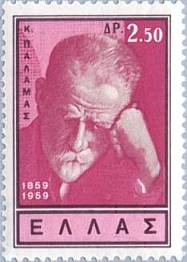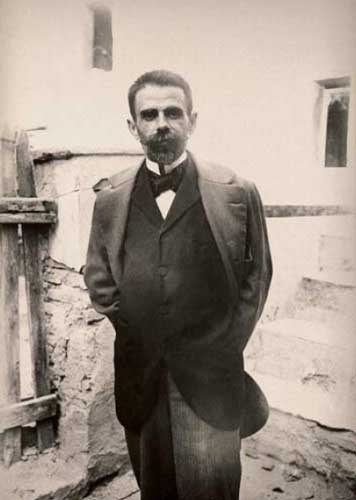|
|
Kostis Palamas ( )(13.1.1859 - 27.2.1943 ) was a Greek poet. Born in Patras, he received his primary and secondary education in Missolonghi. In the early 1880s, he worked as a journalist and literary critic. He published his first collection of verses, "The Songs of My Fatherland," in 1886. He was secretary general of the University of Athens, between 1897 and 1926. He died during the German occupation of Greece in 1943 and his funeral was a major event of the Greek resistance. “Ηχήστε, οι σάλπιγγες... Καμπάνες βροντερές, δονήστε σύγκορμη τη χώρα, πέρα ως πέρα...Βογγήστε, τύμπανα πολέμου... οι φοβερές σημαίες, ξεδιπλωθείτε στον αέρα! Σ’ αυτό το φέρετρο ακουμπά η Ελλάδα!",
Kostis Palamas around 1900 (National Hellenic Research Foundation) He has been called the "national" poet of Greece and was closely associated with the struggle to rid Modern Greece of the "purist" language and with political liberalism. He dominated literary life for 30 or more years and greatly influenced the entire political-intellectual climate of his time. Romain Rolland considered him the greatest poet of Europe and he was twice nominated for the Nobel prize for poetry but never received it. His most important poem "The twelve lays (or words) of the gypsy" (1907) is a poetical-philosophical journey. His "Gypsy" is a free thinking, intellectual rebel. He is a Greek Gypsy, in a post classical, post byzantine Greek world. He explores work, love, art, country, history, religion and science, keenly aware of his roots and of the contradictions between his gypsy, classical and christian heritage. http://www.moskios.com/main/alx0123.html
Olympic Hymn Ancient immortal spirit, unsullied father of Illuminate the endevour of the noble contests Vales, mountains and oceans shine with Thee Kostis Palamas
Retrieved from "http://en.wikipedia.org/"
 |
|
|||||||||||||||||

